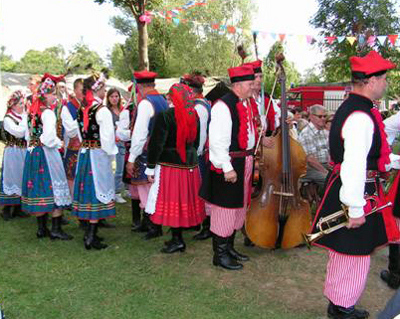More Pronoun Fun: Ci, Te Posted by Anna on Aug 8, 2008 in Grammar
Ok, so today I’m supposed to tell you how to figure out the gender when it comes to plural nouns and adjectives. But first, we need to talk just a tiny little but about those plural nouns and their genders.
You see, those plural nouns can be confusing. They are even to me. And I should know this stuff, I’m Polish. But even so, I sometimes have to stop and think about it.
That we have three genders in singular you know already. However, in plural, those three genders become two. And they’re no longer so nicely organized into masculine, feminine, and neuter. Oh no! Polish can’t be THAT easy!
Instead, our plural nouns have two bizarre genders called:
– personal masculine
– everything else.
Of course the second one isn’t really called that, it has a long and useless Polish name, but for all intents and purposes, you just need to remember that it encompasses everything that doesn’t fall into the first group.
And what does fall into the first group? As the name suggests – “persons”. Personal masculine plural is used to describe either more than one male person, or a mixed male-female group.
Everything else is non-“personal masculine”, be it a group of girls, a herd of cats or a pile of papers. Kind of sexist, wouldn’t you say?
How does all this work in practice? It’s not as hard as it looks, that’s for sure. The problem is that you need to remember those pesky singular genders, at least when it comes to persons.
So let’s pick an example.
Wspaniali ludzie (great, wonderful people), if I remember correctly was how our Japanese friend Atsuko described the people she met in Poland.
Ludzie (people) is a mixture of males and females one would presume, so you can safely state this plural gender is of the personal masculine variety.
The adjective here “wspaniały” had to agree in gender and number with the noun “ludzie”, hence “wspaniali”.
Now let’s try the same with “girls” (dziewczyny):
wspaniałe dziewczyny (in singular would be: wspaniała dziewczyna)
And these are the only two forms that our wspaniałe (wonderful) adjectives get when they describe plural nouns.
See, it wasn’t so bad?
And remember our little pronouns “ten, ta, to” (this) and how they can help us determine the correct gender? The same is true in plural, except of course, instead of “this” the word is “these”.
- ci – “these” for plural person-masculine nouns
For example:
ci ludzie – these people
Or even:
ci wspaniali ludzie – these wonderful people

Ci wspaniali ludzie, as seen here are taking part in “dożynki” – a traditional Polish harvest festival.
Photo courtesy of Jan Panek.
- Te – “these” for all other plural nouns
For example:
te dziewczyny – these girls
Or even:
te wspaniałe dziewczyny – these wonderful girls
Apart from male humans and mixed gender human company, everything else is described using the word “te” (these):
- te koty – these cats
- te papiery – these papers
- te pomidory – these tomatoes
All this grammar overload makes me tired and I think we should stop now. Next time we’ll talk about something more fun!

Build vocabulary, practice pronunciation, and more with Transparent Language Online. Available anytime, anywhere, on any device.




Comments:
Gail:
Anna: I am not surprised at the ignorance of Polish history with Polish school children. In our Polish parish, they no longer teach Polish and the nuns do not speak the language anymore. Now they speak and teach Spanish!!
Have you had a chance to search the info about the Archives I asked a while back? I know you are busy and searching can take a long time. Thanks Gail
Anna:
Hi Gail!
I “outsourced” the search to a friend who lives nearby there, and I am still waiting to hear about the results myself. She’s trying to find out if the actual documents still even exist. As I said before, it looks like a lot had been destroyed during ww2 unfortunately.
And in your Polish parish they teach Spanish now? Well, certainly Spanish is a useful language to know these days, but c’mon now. It’s supposed to be a Polish parish!!! That is really sad.
Stefan:
Hi,
I like your block. It has helped to learn English. I like these kinds of essays which you have published. I would like to read more and more. Do you have some different offers?
Thank you very much for everything.
Stefan
John:
Hello,
I was wondering if someone on this site may be able to assist me?
My future father-in-law is from Poland and he was asking me about english words and why they are pronounced they way they are.
Do you know of any books that are written in Polish but explaining the English language?
Thank you!
Anna:
Hi John!
There are many such books, and I would suggest your future father-in-law ask at a nearest English language school. The teachers there should be able to help him. I remember there were several books about the quirks and dangers of translating from Polish to English, and even though they were aimed at a professional reader, their contents were fun and easy to understand even for non-linguists. But as I said, I’d suggest him to ask an English teacher. It’s hard for me to recommend something without knowing his English proficiency level. Good luck!
John:
Would you be able to give me a coupel recommendations anyway?
I would really appreciate it….
I am actually trying to surprise him with it.
Thank you!